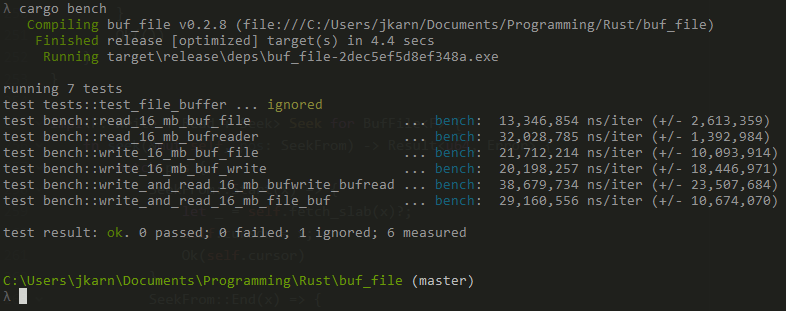Uses old Rust 2015
| 0.2.9 |
|
|---|---|
| 0.2.8 |
|
| 0.1.1 |
|
#25 in #buffered
94KB
487 lines
BufFile-rs
A Buffered File for rust that allows both reading and writing.
By default, each "hotspot" (referred to as slab in the code) is 512kb in size, this can be changed quite easily by moving file_buffer.rs into your rust project, rather than using the crate.
Performance
Under the right conditions, BufFile can outperform BufReader and BufWriter, or a combination of BufReader and BufWriter. As shown by the very simple benchmarks in src/lib.rs (tests that end in buf_file use the BufFile, others use BufReader or BufWriter):

These benchmarks use version 0.2.8.
The performance gain in these examples can likely be contributed by the larger default cache size of BufFile, but when used for random access files, the performance gain when compared with BufReader and BufWriter is even further exaggerated, and not simply from a larger cache size (it is cumbersome to use the two anyways).
Example Usage
This example is a bit obtuse but it demonstrates the relative speed of the BufFile
Cargo.toml
[dependencies]
buf_file = "0.2.8"
some_file.rs
use std::time::{ SystemTime };
use std::io::{ Error, Seek, SeekFrom, Write, Read, BufWriter};
use std::fs::{ File, OpenOptions };
use buf_file::*;
let num_mb = 128;
let dat = vec![1u8; 1024];
// Write some data using a BufWriter, time it
let mut t2 = OpenOptions::new().read(true).write(true).truncate(true).create(true).open("xasd.tree").unwrap();
let mut file2 = BufWriter::new(t2);
let now = SystemTime::now();
for i in 0..num_mb * 1024 {
file2.write(&dat[0..]).unwrap();
}
match now.elapsed() {
Ok(a) => {
let seconds = a.as_secs() as f64 + (a.subsec_nanos() as f64 / 1e9f64);
println!("time to write {} megabytes with BufWriter: {:?}\n{} mb / s WRITE", num_mb, seconds, num_mb as f64 / seconds);
},
Err(_) => panic!("Error measuring time.."),
};
// Write some data using a BufFile, time it
let mut t1 = OpenOptions::new().read(true).write(true).truncate(true).create(true).open("test.tree").unwrap();
let mut file = BufFile::with_capacity(8, t1).unwrap();
let now = SystemTime::now();
for i in 0..num_mb * 1024 {
file.write(&dat[0..]).unwrap();
}
match now.elapsed() {
Ok(a) => {
let seconds = a.as_secs() as f64 + (a.subsec_nanos() as f64 / 1e9f64);
println!("time to write {} megabytes with BufFile: {:?}\n{} mb / s WRITE", num_mb, seconds, num_mb as f64 / seconds);
},
Err(_) => panic!("Error measuring time.."),
};
// Sample output (from output on windows x64, with an SSD):
//
// time to write 128 megabytes with BufWriter: 0.1323519
// 967.1187191117015 mb / s WRITE
// time to write 128 megabytes with BufFile: 0.1970247
// 649.6647374669268 mb / s WRITE